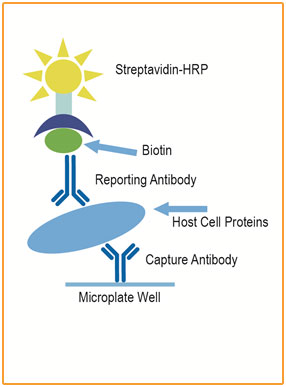
ABCEPTA and WuXi: Anti-Host Cell Protein (Anti-HCP) Antibodies Integrated Service
Host cell proteins (HCPs) are proteins and derivatives from the host cells; they are deemed contaminants if present even in residual amounts in biologically produced drug samples.
E. coli, Yeast, Mammalian Cells like Human Embryonic Kidney 293 cells(HEK29), Chinese hamster ovary cell s(CHO), Vero cells etc.
Mainly from host cell lysates and secreted or processed residues
Host cell protein (HCP) reduces drug efficacy and may induce side-effects. Therefore, it needs to be effectively measured and removed during the drug development processes. Anti-HCP antibodies are an effective method for removing HCPs, and provide qualitative and quantitative HCP analysis during method development and drug production.
ABCEPTA specializes in antibody productions. Abcepta’s extensive experience in production of anti- HCP antibodies is derived from the rigorous development and manufacture of Anti-HCP antibodies for our parent WuXi Pharmatech, a global CRO. These reagents have been successfully employed to identify and mediate host cell protein challenges in a multitude of biopharmaceutical processes.
To meet customer requirements for anti-Host Cell Protein Antibodies (Anti-HCP), Abcepta works within an integrated service platform from antigen to antibody validation.

- Host cell protein isolation
- Host cell protein separation
- Host cell protein identification
- Pre-immune serum control
- Immunization animals: Rabbits, Sheep, Monkey etc.
- Complete immunization program
- Indirect ELISA tests
- Antibody Purification
- Coverage tests: Two-dimensional (2-D) electro phoresis and Immunoblotting
- Antibody Labeling
- Multiple anti-antibodies optimization
- Sandwich ELISA set
- Integrated experimental procedure and report
- Accurate and precise Validation
- Lower Limit of quantification etc














 Foundational characteristics of cancer include proliferation, angiogenesis, migration, evasion of apoptosis, and cellular immortality. Find key markers for these cellular processes and antibodies to detect them.
Foundational characteristics of cancer include proliferation, angiogenesis, migration, evasion of apoptosis, and cellular immortality. Find key markers for these cellular processes and antibodies to detect them. The SUMOplot™ Analysis Program predicts and scores sumoylation sites in your protein. SUMOylation is a post-translational modification involved in various cellular processes, such as nuclear-cytosolic transport, transcriptional regulation, apoptosis, protein stability, response to stress, and progression through the cell cycle.
The SUMOplot™ Analysis Program predicts and scores sumoylation sites in your protein. SUMOylation is a post-translational modification involved in various cellular processes, such as nuclear-cytosolic transport, transcriptional regulation, apoptosis, protein stability, response to stress, and progression through the cell cycle. The Autophagy Receptor Motif Plotter predicts and scores autophagy receptor binding sites in your protein. Identifying proteins connected to this pathway is critical to understanding the role of autophagy in physiological as well as pathological processes such as development, differentiation, neurodegenerative diseases, stress, infection, and cancer.
The Autophagy Receptor Motif Plotter predicts and scores autophagy receptor binding sites in your protein. Identifying proteins connected to this pathway is critical to understanding the role of autophagy in physiological as well as pathological processes such as development, differentiation, neurodegenerative diseases, stress, infection, and cancer.